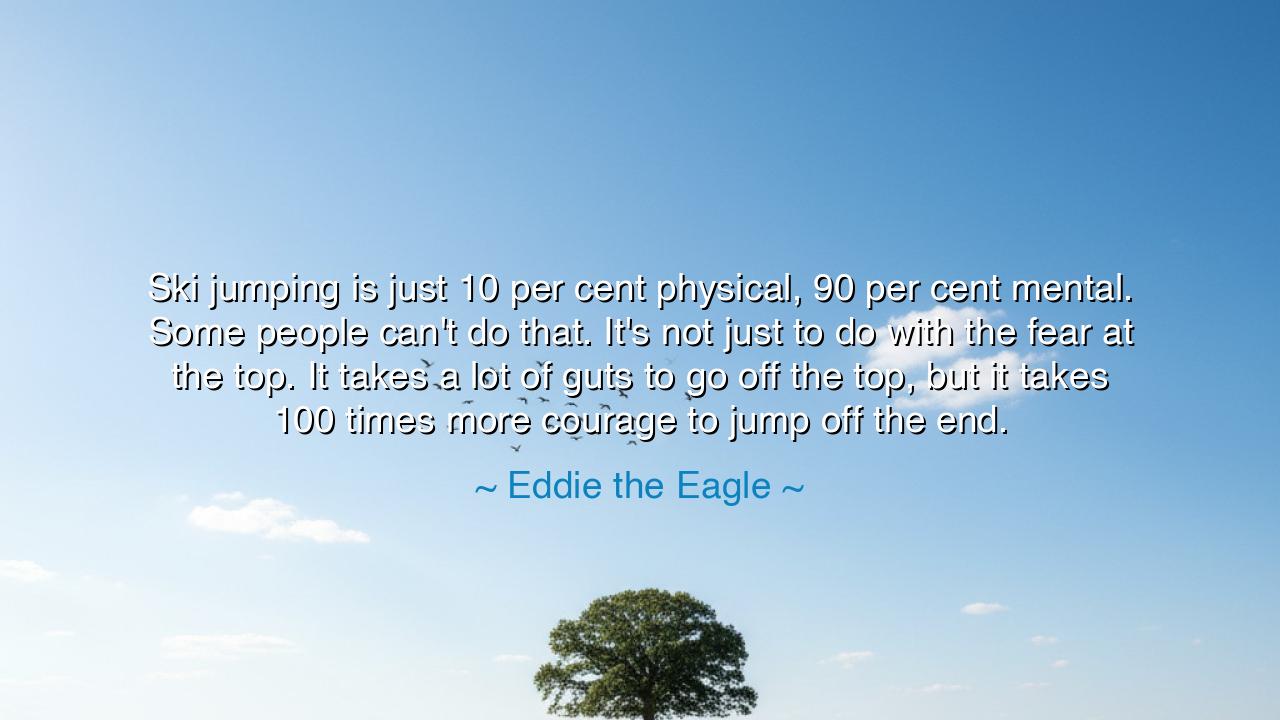
Ski jumping is just 10 per cent physical, 90 per cent mental.
Ski jumping is just 10 per cent physical, 90 per cent mental. Some people can't do that. It's not just to do with the fear at the top. It takes a lot of guts to go off the top, but it takes 100 times more courage to jump off the end.






“Ski jumping is just 10 per cent physical, 90 per cent mental. Some people can't do that. It's not just to do with the fear at the top. It takes a lot of guts to go off the top, but it takes 100 times more courage to jump off the end.” — Thus spoke Eddie the Eagle, the unlikely hero of the Winter Games, whose courage and humility transformed failure into legend. Though his words concern the art of ski jumping, they speak to the deeper art of life itself. For what he describes is not merely a sport, but the eternal struggle between the body’s instinct for safety and the soul’s longing for flight. In this truth, Eddie reveals that courage is not born at the beginning of the journey, but in the moment when there is no turning back — when one must leap into the unknown, trusting only in spirit and will.
The origin of this quote comes from Eddie’s own story — one of persistence, ridicule, and triumph of heart over circumstance. Born Michael Edwards, he was no prodigy of athletics, no champion groomed for greatness. He was an ordinary man who dreamed an extraordinary dream: to represent his country in the Olympic Games. Lacking resources, training, and even proper equipment, he endured mockery and rejection. Yet what set him apart was not strength or speed, but mental courage — the refusal to surrender to doubt. When he stood at the top of the jump, wind biting his face and the abyss yawning below, it was not his muscles that carried him forward, but the force of his belief.
To say that ski jumping is “90 per cent mental” is to speak of the invisible battle that precedes all visible action. The body may be ready, the training complete, the path prepared — yet without the mind’s command, the leap never comes. Fear whispers of the fall, of failure, of humiliation; courage answers not with certainty, but with faith. Many have the physical ability to climb the ramp — to stand at the edge of their dreams — but few possess the inner stillness to leap from it. Thus, Eddie’s words echo the wisdom of ages: that the greatest victories are not of strength, but of spirit.
The same truth burns in the heart of every great endeavor. Consider the story of Amelia Earhart, who, like Eddie, faced the vastness of the unknown. When she set out to fly across the Atlantic alone, the world doubted her, warned her, mocked her ambition. Yet she understood what Eddie knew — that the hardest part is not the first step, but the moment before the leap. As the engines roared and the ocean stretched below, it was not skill alone that carried her skyward, but the courage to jump off the end — to cross the threshold from fear into freedom.
Eddie’s distinction between “guts” and “courage” is subtle and profound. “It takes a lot of guts to go off the top, but 100 times more courage to jump off the end.” Guts may carry one into danger, but courage carries one through it. Guts are the roar of adrenaline; courage is the calm of conviction. Many can begin boldly — can climb to the top, declare their dreams, and imagine glory — but few can finish, few can continue when the fall feels imminent and the crowd’s cheers turn to silence. True courage, then, is not the denial of fear, but the mastery of it — the quiet voice that says, “Leap anyway.”
In this way, Eddie the Eagle stands as a symbol of all who dare to try. He did not win medals, yet he won hearts, for he embodied the noblest form of courage: not triumph over others, but triumph over self. He reminds us that greatness is not defined by outcome, but by effort — by the willingness to leap when others stand frozen. His flight, though brief, soared higher than the measure of distance, for it was a victory of the soul over the weight of doubt.
So, my listener of the future, learn from this teaching: the leap is always mental before it is physical. In your own life, you will stand at many edges — of decisions, dreams, and transformations. You will feel fear whisper, “Stay.” And in those moments, remember Eddie’s wisdom: that courage is not found in the climb, but in the release. Prepare yourself well, yes, but when the time comes, jump — not recklessly, but faithfully. For no one ever soars by standing still.
In the end, Eddie’s words are not about skiing, but about living. Life itself is a mountain of countless jumps — each demanding more courage than the last. The body trembles, the heart hesitates, but the soul longs for flight. And when you finally leap, when you surrender fear and trust the invisible air beneath you, you will find what all heroes have found before: that the true victory is not in landing safely, but in daring to fly at all.






AAdministratorAdministrator
Welcome, honored guests. Please leave a comment, we will respond soon